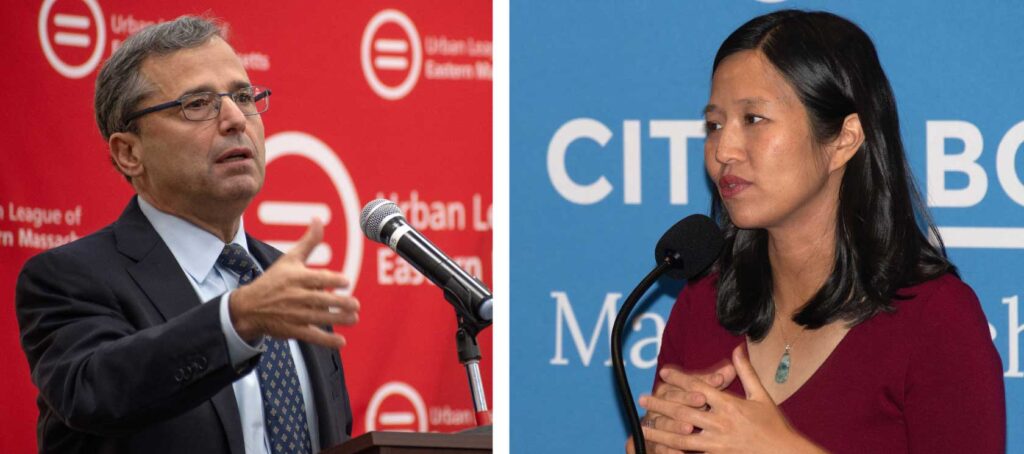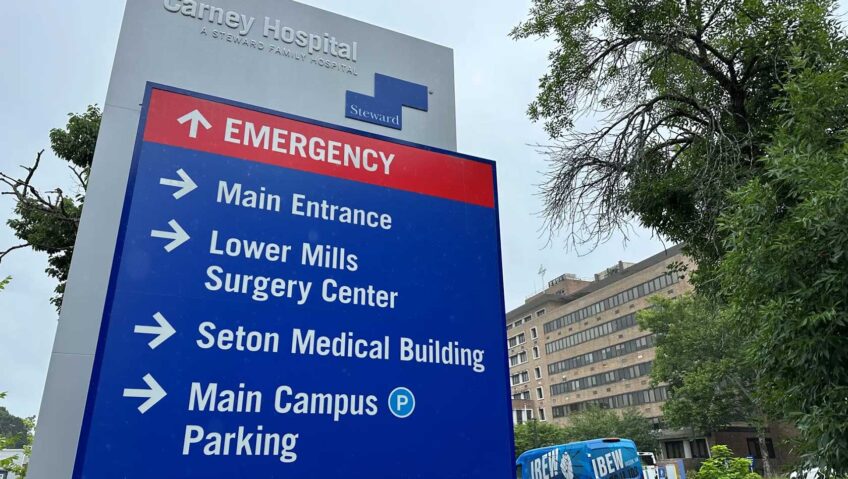
Just days before Boston’s preliminary mayoral election, Mayor Michelle Wu and challenger Josh Kraft outlined their visions for the city in NBC10’s “Final Word” forum on Sept. 3.
The event featured questions about topics like housing and immigration as well as day-to-day city processes like contracting with businesses and managing the city’s rat troubles.
The event featured Wu and Kraft — two of the four candidates vying to make it past the Sept. 9 preliminary election. NBC10 said the candidates were selected based on highest polling numbers between June 24 and Aug. 1; the two candidates, NBC10 said, together made up 90% average of support based on the polls.
Community organizer Domingos Da Rosa and perennial candidate Robert Capucci are also running for the city’s top seat but were not included in the forum. Following the Sept. 9 election, the top two vote-getters will proceed to the general election Nov. 4.
At the forum, Wu and Kraft each had 30 minutes to respond to approximately the same set of questions from a panel comprised of NBC10 political reporter Matt Prichard, the Black Economic Council of Massachusetts’ President and CEO Nicole Obi and Embrace Boston’s President and CEO Imari Paris Jeffries. The forum was moderated by NBC10 Boston news anchor Latoyia Edwards.
Wu leaned on her status as the incumbent to offer up a list of policies and actions her administration has taken over the past four years.
Kraft’s answers, meanwhile, were often pulled from personal anecdotes. He referenced his grandparents’ own migration to escape the Nazis during a question about how city policy would intersect with Immigration Customs and Enforcement, and he invoked his late mother’s love of the arts in a question about arts and culture.
On housing
Two questions for the candidates focused on their proposals on housing access, both around reducing displacement and ensuring housing for working-class families.
Wu said that her administration has “been putting everything we’ve got” into housing efforts. She pointed to city efforts to help families buy homes in the city — as of January, 678 residents had participated in the city’s homebuying programs since Wu took office — and to identify vacant lots where housing can be built.
She also touted efforts to make the construction of accessory dwelling units — also known as “granny flats” — easier, and recent steps convert unused office space downtown into housing or to support co-purchasing, which allow families or friends to buy multi-family properties together.
When asked what grade she would give her administration on its housing efforts, she said the work is “incomplete.”
“We have a lot of work to do on housing, and that is felt across every single neighborhood, but we have made some record progress in building systems, creating programs that are really working,” Wu said.
Kraft highlighted a handful of proposals that have been talking points throughout his campaign, including his “opt-in rent control” proposal that would offer landlords a 20% rebate on real estate taxes at the end of each year if they commit to keep rents at “sustainable and minimal increases” of the rate of inflation plus five percent for 10 years.
The program would be limited to renters earning less than 200% of the area median income.
That plan, Kraft said, has already received the backing of one landlord with 600 units in the city.
Previously, in an interview with GBH, Wu has called the proposal “fake rent control.” In that interview, she said that rent control implies a level of government involvement and protection.
But for Wu, who ran on bringing back rent control when she was first elected as mayor in 2021, efforts to implement a more concrete rent control system have been stymied by barriers at the State House. Rent control policies were banned across Massachusetts, through a 1993 ballot question, though a current bill in front of the legislature, as well as ballot question set to appear on the 2026 ballot, aim to bring it back.
Kraft also called for “jumpstarting” the construction of 26,000 units of already approved housing that he said can’t currently be built due to expenses.
A housing access plan released by the Kraft campaign points, among other factors, to requirements from the Wu administration that new housing projects include 17% to 20% income restricted units, compared to the 13% that was required under the mayoral administration of Marty Walsh.
Developers, alongside Kraft, have said that the policy has limited housing construction; however economists have said that pinning the downturn on the shift is an oversimplification, according to reporting by the Boston Globe.
At the forum, Kraft said that the construction of those units would bring in tax revenue that would allow his administration, if elected, to fund his opt-in rent control tax rebates, as well as provide additional support for first-time homebuyer programs in the city.
Generally, he said a Kraft administration would be “neighborhood-based” and in frequent conversation with community members to reduce displacement or communicate about potential impacts earlier.
“When we’re in discussions about possible development that might displace people, those folks that might be displaced are not going to hear about it at the end, because they’re going to be involved in the discussions from the beginning,” he said. “And we will make sure that if displacement is potentially there, we’re going to create a fund to help relieve displacement.”
On immigrant protections
Both Wu and Kraft voiced continued support for the city’s immigrant communities, amid continued efforts from the Trump administration for the mass deportation of undocumented immigrants.
The two candidates voiced continued support for the Boston Trust Act, a city ordinance that prohibits the city’s police officers from working with ICE on civil immigration enforcement efforts but allows collaboration on criminal issues.
State law too, creates guardrails around how police can interact with ICE. A 2017 Supreme Judicial Court ruling found that law enforcement officers can’t arrest, detain or hold an individual only on a federal civil immigration detainer, and laws passed by the legislature prohibit policing based on things like immigration status.
Both pushed back on the use of the term “sanctuary city,” which Kraft called “a political term, not a legal term.” Wu said Boston follows the law, when it comes to immigration, “at the city level, the state level and the federal level,” and said that the federal government — not city law enforcement — is responsible for immigration enforcement.
Wu repeated her oft-used description of Boston being the safest major city in the United States — a claim that national data suggests might not be so clear-cut.
Kraft, meanwhile, expressed an interest in working with the state’s federal delegation to try to speed up citizenship efforts for immigrants in the commonwealth.
On diverse city procurement
Obi, from BECMA, posed a question to both candidates about furthering city procurement efforts with small and microbusinesses — often defined as having fewer than 10 employees — especially those owned and operated by women and people of color.
Kraft said that, if elected, he would create a small business council to connect business owners with mentors and the resources needed to respond to city contracting.
And he proposed a “Black business credit initiative,” to contribute more dollars to Black entrepreneurship. He would implement the same concept, he said, for women-owned businesses.
“Boston is a city of neighborhoods; the heartbeat of every neighborhood is our small businesses,” he said. “When they succeed, the entire city succeeds, so we have to make sure all small businesses succeed.”
During Wu’s forum, she pointed to city initiatives from the past four years and earlier that she said have supported increases in spending with minority- and women- owned businesses, like community partnerships, a reformed purchasing plan and a new data dashboard that tracks the city’s spending with diverse businesses.
Over the course of her term in office, the city has increased the amount of municipal money spent on contracts with minority- and women-owned businesses from $66.6 million in 2022, her first year in office, to $144.4 million in 2024, according to the city dashboard.
City contracts with minority- and women-owned businesses dropped in Wu’s first year — from $85 million in 2021 to $66 million in 2022 — before topping $100 million in 2024, a new record.
“When we spend dollars as a city through city contracts … that is a dollar that is spent that could then come back to our community if we’re investing it in a local business,” Wu said.
Highlighting her decade-long track record in municipal government, she cited an effort from her Boston City Council days to create the first rules governing city contracts with women- and minority-owned businesses. That ordinance, submitted by Wu in partnership with then-Councilor Ayanna Pressley, was passed by the body at the end of 2017.
On rats
Panelists at the forum also raised questions to both candidates about the city’s rat population, something they said is as likely to come up with conversations with residents about community concerns as housing.
Wu’s response focused on the city’s Rodent Action Plan, released last summer. That plan aims to limit rats’ access to food and water to limit the spread of rodent populations — targeting prevention rather than reaction.
At the forum, Kraft’s responses to Boston’s rat problem focused largely on addressing infestations as they arise, though his campaign website also outlines additional preventative measures.
He said that, if elected, he would implement city vans that would be on-call to deal with rat infestations 24/7. A mediation fund would help small businesses and residents pay to deal with rats if they can’t afford it. And he said he would centralize rodent control efforts in a new Office of Rat and Pest Control.
When the city launched its Rodent Action Plan in June 2024, it specifically spread out efforts to address the city’s rodent infestations across departments because rats “don’t respect agency boundaries,” said Robert Corrigan, a rodentologist and the report’s author, in an August 2024 interview with the Banner. Corrigan said that reacting to an infestation in a sewer might just push the rat populations up into park spaces or residential areas.
Voters can cast their ballot at their specified polling place on election day, Tuesday, Sept. 9, from 7 a.m. to 8 p.m.







Leave a Reply
You must be logged in to post a comment.